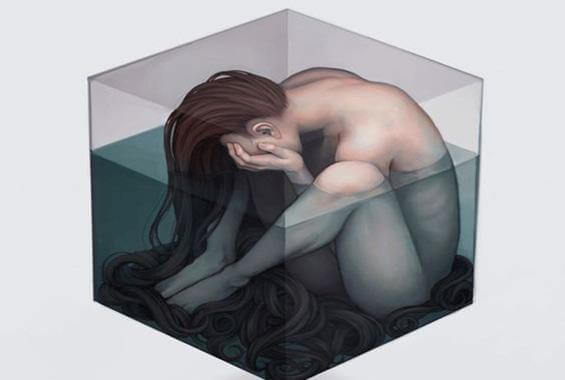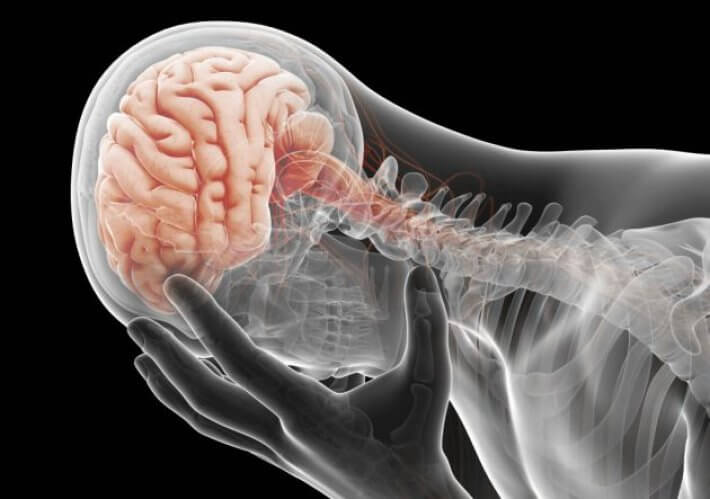Depression: A Chemical and Emotional Drift in Our Brains

Depression is a continuous drift where the days drag by slowly. Where there are no longer any tears left, though you crave a good cry. Where you feel like you’re dying, because there are no more smiles left for your hopeless brain…
This sensation is very familiar for many people. It refers to a tremendously complex and unique mood disorder. Depression is a public health problem of great impact. According to the WHO (World Health Organization), it will increase in frequency in the next couple of years.
You smile, but you’re not happy. You cry, but there are no tears. You’re breathing, but you don’t feel alive. You may not understand it, but this is the face of depression. Something you have not chosen, although you may not believe it.
We invite you to delve into this interesting aspect of our health and well-being.

Depression, a silent stigma
Depression doesn’t happen overnight. Nobody chooses it outright as part of their everyday life. Nor do any of us opt for this type of disconnection from the basic rhythm of life. A disconnection from positive emotions, from happiness. It simply has a very slow onset. It advances slowly and heavily until it sinks us into helplessness, a bad mood, pessimism and the inability to react.
Michael King, psychiatrist and professor in the Mental Health Sciences Department at University College London (UCL), is one of the people responsible for the famous PredictD test. This test seeks to predict the risk one has of developing depression. As he explains, nowadays this disease is still too stigmatized.
Just as different studies reveal, it is estimated that almost 50% of depressive disorders don’t receive any treatment. Or, they don’t receive the best type of treatment for the individual needs of each patient. This all leads to thousands of people advancing towards the drift in their own personal scenarios. And thousands of people around the world choose suicide as a solution to their pain and sorrow. This, or they simply conform with facing their lives one relapse after another.

When the brain gets out of tune with life
According to more spiritualistic tendencies, all of us are capable of “vibrating”. You could say that people emit a certain inner music. This music, in turn, allows us to connect with our peers, with certain places, contexts, and activities that resonate with our personality. This inner “melody” is a reflection of an active, passionate, curious brain.
When depression sets in, that ability to vibrate shuts down because the electric impulses of certain parts of the brain are reduced or slow down. We enter a state of semi-lethargy, where less neuronal synapses take place. A deep and delicate chemical drift takes hold which is hard for us to emerge from and reconnect with our lives.
We’ll look deeper into this below.

The effects of depression on cerebral “architecture”
It’s important to point out that depression doesn’t originate exclusively from an imbalance in our neurotransmitters. Genetic vulnerability, emotional factors and even medical problems can without a doubt predispose us. Nevertheless, the effect that this disorder has on our brain is remarkable. Let’s look into it.
- The hippocampus: is part of the limbic system and is responsible for the processing of memory, especially long-term memory. According to several studies, experiencing long periods of depression or chronic stress provoke the reduction of the size of this structure. We suffer from memory loss and difficulty concentrating.
- Depression, in turn, orchestrates a subtle and complex chemical chaos in which acetylcholine, serotonin, norepinephrine or dopamine, are going to get our emotional balance out of tune. This will make it hard for us to fall asleep, or feel motivated about something or someone, to the point of literally feeling like the world has shut all of its doors to us.
- Another structure to keep in mind is the thalamus. This is a neuronal area that receives sensorial information and transmits it to the corresponding area of the cortex. Thanks to this area, functions like talking and movement are controlled. Patients with depression experience a certain degree of sluggishness when it comes time to move or communicate with agility and cheerfulness. It is very striking.

Depression, thus, is a complex enemy that sets up shop within our brains and hearts, where it hurts us the most. Our thoughts become chaotic, disorganized and bitter. To the point that they can fall into a mental and emotional drift that can last years.
Don’t let it happen. Don’t give up on yourself. Allow yourself to be helped. And, above all, fight to make it to the shore. To once again strap on the boots of hope and illusion and the glasses of optimism.
Depression is a continuous drift where the days drag by slowly. Where there are no longer any tears left, though you crave a good cry. Where you feel like you’re dying, because there are no more smiles left for your hopeless brain…
This sensation is very familiar for many people. It refers to a tremendously complex and unique mood disorder. Depression is a public health problem of great impact. According to the WHO (World Health Organization), it will increase in frequency in the next couple of years.
You smile, but you’re not happy. You cry, but there are no tears. You’re breathing, but you don’t feel alive. You may not understand it, but this is the face of depression. Something you have not chosen, although you may not believe it.
We invite you to delve into this interesting aspect of our health and well-being.

Depression, a silent stigma
Depression doesn’t happen overnight. Nobody chooses it outright as part of their everyday life. Nor do any of us opt for this type of disconnection from the basic rhythm of life. A disconnection from positive emotions, from happiness. It simply has a very slow onset. It advances slowly and heavily until it sinks us into helplessness, a bad mood, pessimism and the inability to react.
Michael King, psychiatrist and professor in the Mental Health Sciences Department at University College London (UCL), is one of the people responsible for the famous PredictD test. This test seeks to predict the risk one has of developing depression. As he explains, nowadays this disease is still too stigmatized.
Just as different studies reveal, it is estimated that almost 50% of depressive disorders don’t receive any treatment. Or, they don’t receive the best type of treatment for the individual needs of each patient. This all leads to thousands of people advancing towards the drift in their own personal scenarios. And thousands of people around the world choose suicide as a solution to their pain and sorrow. This, or they simply conform with facing their lives one relapse after another.

When the brain gets out of tune with life
According to more spiritualistic tendencies, all of us are capable of “vibrating”. You could say that people emit a certain inner music. This music, in turn, allows us to connect with our peers, with certain places, contexts, and activities that resonate with our personality. This inner “melody” is a reflection of an active, passionate, curious brain.
When depression sets in, that ability to vibrate shuts down because the electric impulses of certain parts of the brain are reduced or slow down. We enter a state of semi-lethargy, where less neuronal synapses take place. A deep and delicate chemical drift takes hold which is hard for us to emerge from and reconnect with our lives.
We’ll look deeper into this below.

The effects of depression on cerebral “architecture”
It’s important to point out that depression doesn’t originate exclusively from an imbalance in our neurotransmitters. Genetic vulnerability, emotional factors and even medical problems can without a doubt predispose us. Nevertheless, the effect that this disorder has on our brain is remarkable. Let’s look into it.
- The hippocampus: is part of the limbic system and is responsible for the processing of memory, especially long-term memory. According to several studies, experiencing long periods of depression or chronic stress provoke the reduction of the size of this structure. We suffer from memory loss and difficulty concentrating.
- Depression, in turn, orchestrates a subtle and complex chemical chaos in which acetylcholine, serotonin, norepinephrine or dopamine, are going to get our emotional balance out of tune. This will make it hard for us to fall asleep, or feel motivated about something or someone, to the point of literally feeling like the world has shut all of its doors to us.
- Another structure to keep in mind is the thalamus. This is a neuronal area that receives sensorial information and transmits it to the corresponding area of the cortex. Thanks to this area, functions like talking and movement are controlled. Patients with depression experience a certain degree of sluggishness when it comes time to move or communicate with agility and cheerfulness. It is very striking.

Depression, thus, is a complex enemy that sets up shop within our brains and hearts, where it hurts us the most. Our thoughts become chaotic, disorganized and bitter. To the point that they can fall into a mental and emotional drift that can last years.
Don’t let it happen. Don’t give up on yourself. Allow yourself to be helped. And, above all, fight to make it to the shore. To once again strap on the boots of hope and illusion and the glasses of optimism.
This text is provided for informational purposes only and does not replace consultation with a professional. If in doubt, consult your specialist.







